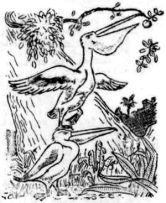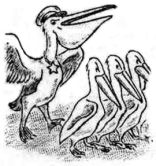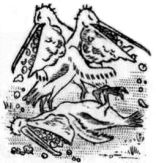 IN the midst of the wild Pacific Ocean lay an island, not more than fifteen miles all round, and its name was Pelican Island. Bleak and barren rose the rocks of Pelican Island, fierce and lonely shattered the sea against its coasts. Here, from a distant time before even man dwelt in caves, and before even birds learnt to fly, lived the first race of the Pelicans. IN the midst of the wild Pacific Ocean lay an island, not more than fifteen miles all round, and its name was Pelican Island. Bleak and barren rose the rocks of Pelican Island, fierce and lonely shattered the sea against its coasts. Here, from a distant time before even man dwelt in caves, and before even birds learnt to fly, lived the first race of the Pelicans.
There was only one object of beauty and value on Pelican Island. The Kobo-tree stood in the very centre of the isle, and its branches spread far and high. It was said indeed that this was the Tree of Life, whose deepest roots were in hell and whose top-most branches touched heaven. At once and all the year round it bore bud, blossom and fruit. The blooms were of all shades, tints, and varieties, each surpassingly beautiful and delicate.
The fruits, too, were of every kind. Some were large and rich, of a full, delicious, heady flavour, that made the eater thereof seem a god among creatures. Others were sweet and languid, and brought dreams and gentle visions; others again were sharp and pungent to the taste, and awakened the mind and brain to keenness; still others had such juices as bit the tongue like fire, and set the blood burning and leaping.
In every season the fruit hung in brilliant clusters, and such was the marvellous nature of the tree that no cluster ever diminished by the plucking of any of its fruits, but all flourished and grew still larger than before. And another great virtue was in the tree, that every fruit added a year to the length of life of whoever ate it.
Although all the Pelicans had heard of the Kobo-tree, only a few had ever seen it, for the way to the centre of the island was rough and stony and beset by thorns and thickets. Many of the Pelicans, indeed, refused to believe in its existence, and scoffed at it as a mere myth, while at the same time they condemned as affectation the claims of those who had seen it and tasted of its fruits. Yet in every age there were a number of Pelicans who found their way along the difficult path to the tree; and never did one regret his struggles.
But of some Pelicans a greater sacrifice was demanded. The tree was not fed solely by its roots and by its leaves spread in the sun; the Pelicans themselves must nourish it. And so it came about that once in a generation a Pelican went alone and of his own free will to the Kobo-tree, and standing among its roots tore open his breast with his sharp beak, and let the rich hot blood flow upon the ground. Thereby the tree grew stronger and greater, and put forth new blossoms and new fruits. Infinite in variety, uniform in delight were the fruits of tho Kobo-tree. Every shade and nuance of flavouring seemed to be in them; and yet each fresh cluster had a new sweetness all its own.
At last after many centuries there arose a valiant Pelican, Sodem by name, and he, looking around, resolved to leave the world a place enriched by his passing through. Hearing of the Kobo-tree he set forth to find it, and soon learned the hardships of the way. Few in all as his fellow-seekers were, many fell out on the march and never reached the goal. He noticed also that among the Pelicans who stayed at home there were some who thought longingly of the tree and desired to see it, but yet through lack of time or lack of some guidance on the way, failed to start on the quest. And he resolved to put this right.
Snatching hastily a few of the fruits, he returned to the Pelican people and began to go about among them, crying out to the people and their leaders: “Why should the few keep all this sweetness and delight to themselves? Why should it not be made easy for every Pelican to visit the delicious and intoxicating Kobo-tree? Let us build a road instead of the tortuous path!”
At first he was laughed to scorn, but after many years when he was old and his wing-quills were dropping out, he gained a hearing and the Council of the Pelicans gave permission for a broad road to be built to the centre of the island. This work was entrusted to Spleb, the son of Sodem, and busily he set to work with his labourers.
Soon they had cut down the bushes and hacked away the thorns, levelled out the uneven way and tunnelled through the rocks; and before long a fair highway stretched wide and shining to the trees. Spleb hired guides to lead the people on the way; and scarcely was the road opened before it was crowded with Pelicans hastening in search of the Kobo-tree. But it must be recorded that the majority of the Pelicans stayed at home and scoffed.
Seeing success in their scheme, and yet piqued because so many refused to traverse their beautiful road, the Council made it law that every Pelican must make the pilgrimage to the tree in his tender youth, and that without it he could not be considered fit to deal with the business of life. More guides were hired, and it became the business of these to seek out the young Pelican, ay, even in his first struggles to emerge from the egg, and carry him and his brothers in batches along the fair highway.
Where once a peaceful, half-deserted pathway had stretched, there ran now a broad and busy road, crammed with hastening Pelicans, and chiefly with parties of young Pelicans under the leadership of guides. Seldom indeed, did the young Pelicans go willingly, and the guides were forced to coax and buffet and entice and drive them along the way, until the poor creatures were faint and weary. But it was the decree of the Council.
When they reached the tree, it was the business of the guides to pluck fruit for their charges, and many a sweet delicacy from the Kobo-tree was crammed rudely down the unwilling throat of a young Pelican, until his childish stomach revolted and the tree became a nightmare to him. But it was for his good: and it was the decree of the Council.
Meanwhile Pelicans of all ages and sizes and descriptions clustered round the lovely and gracious Kobo-tree and clamoured to be fed. But for every one who savoured the delights there were hundreds who gulped the fruit down and could not tell one flavour from another. Many of those soon grew weary of the tree and went away saying that after all it was a very ordinary tree in spite of all the fuss, and that they would have no more of it.
Now Spleb died in all the goodness of his heart and the ripeness of his years and achievements; and it seemed to Omb, his son, that the tree, great though it was, could not possibly grow enough fruit to satisfy the new crowds of eager Pelicans who rushed to it. He had not noticed that the clusters, no matter how often assailed, never grew less but blossomed the more richly. So he decided that the fertility of the tree must be increased.
But few indeed were the Pelicans who would sacrifice their warm, good blood at the roots of the Kobo-tree. One came, and another came, but these seemed not enough. So Omb and his friends came to the tree and announced that they too were ready for the sacrifice, and at this the crowd, who had begun to take a great interest in the noble Pelicans who nourished the tree, gathered round and paid them most fluttering attentions. But instead of shedding their blood, they poured out false and artificial liquids which they had concocted to look the same; and the crowd, of course, knew no difference.
Fed by such strange liquors, the tree began to produce strange blooms and strange fruits. Some were of hideous aspect and harsh biting flavour, while others were rotten and soft at the core. But the Pelicans went on gathering and eating the fruit, and to most of them it was all the same.
 As time went on the procession to the place of sacrifice grew larger, until there were more Pelicans concerned in the nourishment of the tree than in the enjoyment of its produce. And after a while the Pelicans came to believe that their base substitutes were every bit as good as the real heart's blood, and they poured them out in ever-increasing volume at the foot of the tree. Stranger and wilder grew the fruits which sprang forth continually upon the branches, more and more numerous the new clusters, less and less fragrant the blossoms. As time went on the procession to the place of sacrifice grew larger, until there were more Pelicans concerned in the nourishment of the tree than in the enjoyment of its produce. And after a while the Pelicans came to believe that their base substitutes were every bit as good as the real heart's blood, and they poured them out in ever-increasing volume at the foot of the tree. Stranger and wilder grew the fruits which sprang forth continually upon the branches, more and more numerous the new clusters, less and less fragrant the blossoms.
 Soon the Pelicans were bewildered by the enormous number of fruits. And so there arose among them certain Pelicans who professed to make the digestion of the fruit easier. These plucked fruits at random from every cluster, squeezed out a little of their juice, and mingling this with their own saliva, offered the resulting nasty liquid as the very cream and essence of the beautiful Kobo-tree. They set up stalls along the way to the tree, and the majority of Pelicans paused there to drink, and being satisfied, never saw the tree at all. Soon the Pelicans were bewildered by the enormous number of fruits. And so there arose among them certain Pelicans who professed to make the digestion of the fruit easier. These plucked fruits at random from every cluster, squeezed out a little of their juice, and mingling this with their own saliva, offered the resulting nasty liquid as the very cream and essence of the beautiful Kobo-tree. They set up stalls along the way to the tree, and the majority of Pelicans paused there to drink, and being satisfied, never saw the tree at all.
Yet those round the tree went on greedily eating. It became the fashion among them to reckon, not the delight gained from the fruits, but the mere number devoured. More and more clusters burst forth upon the tree, and in greater and ever greater haste the Pelicans rushed madly to snatch each new growth. Soon they had no time to taste the fruit, no time even to swallow it. They simply crammed it into their capacious bills, and on top of that crammed more, until the bills were ready to burst.
The younger Pelicans rushed about among each other, crying: “Have you tasted this? You must taste that!” And the others would answer: “Yes, I must, I must!” or else: “I tried that ages ago; have you tried this?” Then they would open their bills to show what was collected there, and the other Pelicans would exclaim with envy and admiration, quite forgetting that the fruits so readily displayed had never been truly tasted and enjoyed, and had given no virtue to the owner of the laden bill.
Then at last the Pelicans began to grow sick and weary because their bodies were not nourished and yet they seemed to do nothing but eat all day. Their bills grew swollen and unwieldy, their bodies grow small and stunted. They had strange fancies and began to hate each other and the world they lived in, for the fermenting and undigested fruit sent bewildering vapours their heads.
And now there arose the wise Armion, who saw the cause of their sickness, and said to them; “Cease this mad hastening after the newest and brightest fruit; quit this crazy grasping at each thing that comes. Seek under the leaves - the good fruits are there and waiting. You must enjoy them slowly and with all your heart. Savour their sweetness, and it will remain with you for ever; and each fruit will add a year to the length of your lives”.
But unfortunately the Pelicans refused to listen to Armion, and for all that can be known they are rushing about their island to this very day, dragging their enormous, swollen, overladen bills and their poor little under-fed bodies to which no nourishment can pass. And every day the Kobo-tree, wasting its strength on insane growths, wilts at the heart and sinks as if to death. Yet it can never truly die, and perhaps some day, the counsels of the wise Armion will prevail in Pelican Island.
from Zenith No. 2, October 1941, artwork by Harry Turner
|

